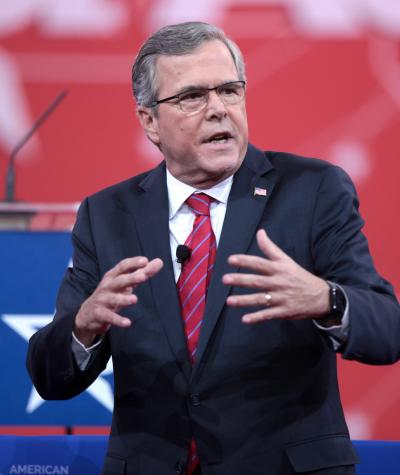Campaign Legal Center (CLC), joined by Democracy 21, has sued the Federal Election Commission (FEC) for its much-belated dismissal of two complaints CLC and Democracy 21 filed seven years ago in 2015 against former Florida Governor John Ellis “Jeb” Bush and the super PAC he established, Right to Rise Super PAC, resurrecting a matter the FEC clearly wanted to bury.
Plaintiffs filed two administrative complaints with the FEC back in March and May of 2015, alleging that Bush had violated a key provision of federal law that prohibits federal candidates from “establishing, financing, maintaining or controlling” any entity that raises or spends “soft money”— funds that do not comply with the federal contribution limits and source restrictions.
By establishing and operating Right to Rise Super PAC, the complaints alleged, Bush and the super PAC violated this prohibition, ultimately raising and spending over $80 million in unregulated soft money to promote his campaign in the 2016 Republican presidential primary election.
Allowing candidates like Bush to illegally “outsource” campaign operations to a supposedly independent super PAC allows them to sidestep important transparency requirements as well, concealing from voters the nature of a candidate’s financial support.
The complaints additionally alleged that Bush had illegally delayed officially declaring his candidacy—likely for the purpose of evading precisely this prohibition on soft money fundraising—and failed to register his campaign committee and file required disclosure reports with the FEC as required.
CLC and Democracy 21 noted that it also appeared that Bush had attempted to game the system by using his leadership PAC and super PAC to finance his “testing the waters” activity in this pre-candidacy period, thus keeping the financing of this activity in the dark.
In a surprise development, FEC Commissioners, usually reluctant to enforce the law against even the most blatant campaign finance violations, were revealed to have at least partly agreed with CLC and Democracy 21’s complaints. Yet instead of investigating the allegations as to which there was consensus, the Commission did nothing – until finally voting in August of this year to dismiss the complaints, more than seven years after they were initially filed.
The case file – which by law remained confidential until the matter was dismissed – revealed that in early 2017, the FEC’s General Counsel had recommended pursuing the violations alleged in the complaints, and all four Commissioners serving in 2018 agreed at various points with this recommendation with respect to at least some of the alleged violations.
Nonetheless, Commission dysfunction meant no vote was held in which all four Commissioners serving in 2018 simultaneously voted to find reason to believe these violations occurred and commence an investigation. The FEC’s failure to act on significant violations of the campaign finance laws was then followed by a dozen more split votes spanning four years to approve the General Counsel’s recommendation or otherwise act on the complaints.
Compounding this breakdown, the case file makes clear that the FEC has also skipped over one of the most basic steps of reasoned decision-making required by the courts: providing a statement of reasons explaining their operative votes in 2018 against finding reason to believe that the alleged violations occurred.
And the current Commissioners do not attempt to paper this over. Commissioner Ellen Weintraub, the only current member of the Commission who was present in 2018, issued a statement upon the dismissal recounting both what she perceived as the failures in the FEC’s decision making in the proceedings and the gravity of the alleged violations.
Three Commissioners who voted to close the file in August issued a statement in which they expressly declined to explain their predecessors’ decision in 2018, noting that they took “no position on the merits of the decisions reached by our predecessors in declining to find reason to believe by the four affirmative votes that the Act requires.”
Thus, the FEC not only failed to muster the votes to take action against serious pre-candidacy violations that previous Commissioners all believed should be pursued, but they have left CLC and Democracy 21 — and the voting public at large — with no rationale at all for the decisive votes.
One can only hope that the Court will act to ensure the FEC blocks candidates seeking to evade federal contribution limits and disclosure requirements by illegally exploiting the “pre-candidacy” period and creating “independent” super PACs to raise soft money.
Otherwise, the FEC’s failure to enforce the law will simply encourage more of this type of pre-candidacy “ghost” campaign. Candidates cannot be permitted to superficially delay the formal announcement of candidacy to build a war chest of unlimited contributions from wealthy special interests to super PACs they establish and finance themselves to “independently” support their campaigns.
To reduce corruption, we need a stronger Federal Election Commission to enforce campaign laws and hold political candidates and their donors accountable.

